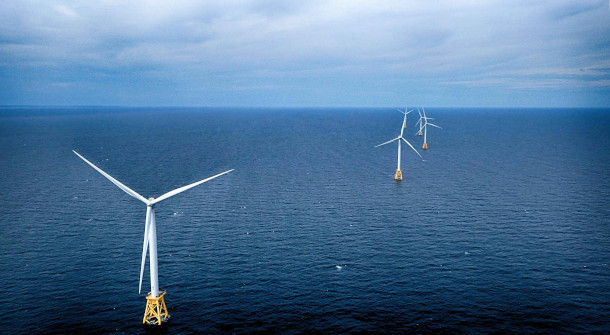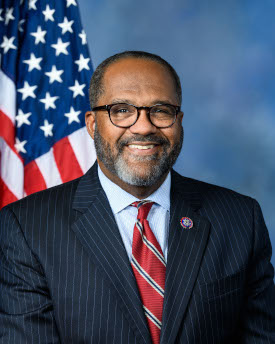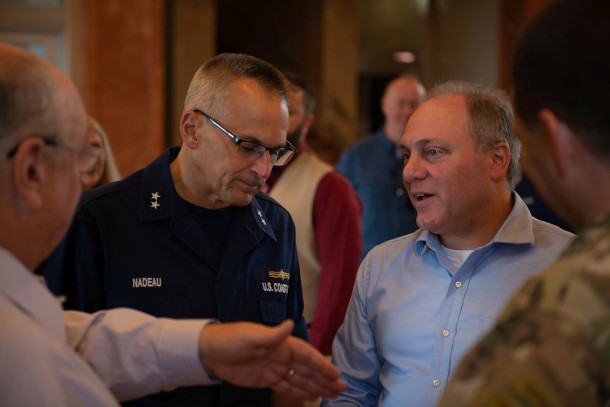Bipartisan Support for Offshore Wind
Air Date: Week of December 9, 2022

The five Alstom Haliade 6 MW turbines of the Block Island Wind Farm near Rhode Island. The wind farm was the first to operate in U.S. waters. Several Louisiana companies with roots in the offshore oil and gas industry helped design and build the farm. (Photo: Ionna 22, Wikimedia Commons, CC BY-SA 4.0)
The Biden Administration is moving forward with plans for auctioning offshore wind energy areas, most recently in the Gulf of Mexico. Meanwhile in Congress, there is a bipartisan effort called the Breeze Act that would update offshore revenue sharing rules that date back to the early days of oil and gas production. Democratic Congressman Troy Carter joins Host Steve Curwood to discuss his collaboration on the legislation with fellow Louisiana Congressman Steve Scalise, the number two House Republican leader, and what the new offshore wind energy areas in the Gulf mean for Louisiana and Texas.
Transcript
BASCOMB: It’s Living on Earth, I’m Bobby Bascomb
CURWOOD: And I’m Steve Curwood
On December 6th, the US held its first ever lease auctions for commercial scale floating wind farms. Those were for California and the Biden Administration recently announced more areas for offshore wind; this time in the Gulf of Mexico near Louisiana and Texas. Offshore wind takes advantage of the engineering used for offshore oil and gas platforms and revenues are shared with the adjacent states. Now there is a bipartisan effort to update offshore revenue sharing rules that date back to early days of oil and gas production. Two congressmen from Louisiana, Democrat Troy Carter and Republican Steve Scalise, currently the number two House Republican leader, are advancing what they call the Breeze Act. This would give states a larger share of offshore royalties than before, incentivize work force diversity and dedicate more funding to coastal restoration and protections. I reached Congressman Carter on the line at his office in New Orleans. Welcome to Living on Earth!
CARTER: Hey, thank you very much. I'm happy to be with you.
CURWOOD: Congressman, how does this announcement of the designation of zones for offshore wind affect the outlook for the wind energy sector and clean energy in general?
CARTER: Well, I think it's a huge step in the right direction. It's an opportunity to really demonstrate that the administration and Congress is serious about reducing our dependency on fossil fuels. Louisiana is a perfect place for it. And I think this is a very, very good thing. Very excited about what it means.

Troy Anthony Carter is an American Democratic politician serving as the U.S. Representative for Louisiana’s 2nd congressional district since 2021. (Photo by U.S. House of Representatives, Wikimedia Commons, Public Domain)
CURWOOD: Now you're a Democrat. And from what I understand in July, you and Republican Steve Scalise introduced the Budgeting for Renewable Electrical Energy Zone Earnings Act called BREEZE, which sets the stage to invest and collect revenue from offshore wind. What's the idea behind this?
CARTER: Well, you know, I have worked tirelessly to try to convince brothers and sisters on the other side of the aisle that clean energy and renewables should not be a partisan issue. This is something that we should work on together, recognizing that we have one Earth, and we've got to protect it. We got one shoreline, the importance of protecting our coasts and those revenues that come from exploration of oil and gas, undoubtably, will be changing. So when we shift to wind, we want to make sure that those revenues that come back to Louisiana, and our revenue sharing does not decrease because we still have a shrinking coastline. So the BREEZE Act is a perfect way to demonstrate one, a commitment but two, the necessity to protect Louisiana's coast.
CURWOOD: So talk to me a little bit about politics here. Steven Scalise is a big member of the Republican Party, he's in the leadership there in the House. And now that the House is now ever so slightly majority Republican, how does that affect the prospects of this measure?
CARTER: Well, it increases it. When we were in charge, I was pushing it hard for my end. Now he pushed it hard from his end. And I know sometimes in Republican circles and Democratic circles, sometimes we bump heads in those issues. Regardless of party affiliation, we got to put people before politics, and we've got to advance those issues that are good for the American people, the Louisiana people, the people of Earth. So I feel very confident as I did when the Democrats are in charge. This is one of those measures that just makes sense.
CURWOOD: Now, this legislation were to be enacted would also cover Texas, which is another major Gulf state. And I think the expectation is that there'll be a lot of offshore wind there as well. What support, if any, are you getting from the Texas delegation?
CARTER: Support has been great. I think that it makes perfect sense. You'd have to really dig deep to be opposed to this. Every now and then you come across legislation that just makes sense. And I expect that the discussions and conversation we've had thus far been very good. I don't anticipate any pushback, because they will enjoy the same benefit that we're fighting for Louisiana, and they have similar issues to protect.
CURWOOD: Now with the advent of offshore wind energy, what's being done for equitable distribution of opportunities for more diverse companies to get into this project, and not just the fossil fuel crowd, which of course, has a leg up because they've been doing offshore platforms for a long time?

Rep. Steve Scalise (R-LA, right) speaks with Rear Admiral John Nadeau (left) from the United States Coast Guard. (Photo: Petty Officer 3rd Class John Michelli, Coast Guard News, Flickr, CC BY-NC-ND 2.0)
CARTER: Well, you know, the hope is that all of the ancillary businesses that are out there. Opportunities to work with minority business development associations, working with the various ancillary groups, working with the local economic development arms, that as we grow into a new era of how we do things, that we are much more sensitive to diversity and inclusion, and working with local players on the ground. And so making sure that opportunity for women-owned, African American owned, disadvantaged business, minority-owned enterprises have an opportunity to participate in this new emerging opportunity as we look to wind and greener energy.
CURWOOD: Now some projections say that offshore wind there in Louisiana, could supply enough electricity to take care of metropolitan New Orleans. And of course, if you don't burn fossil fuel to make electricity, you don't create pollution. What are the local power plants that these wind farms hopefully will replace, and what's the expectation what will happen to air quality there?
CARTER: When we're able to fuel our towns and cities with wind, we save our environment, we save people that have had to endure less than perfect quality of air. It's the kind of win-win, pun intended, that we've hoped for, that we know is out there. And we continue to see issues with poor quality of health and people who are impacted like anything else, the ebbs and flows, having cleaner new technologies, power companies have to figure out how to be a part of the change. Our intent is not to put anyone out of business, our intent is not to decrease the value of our economy. It is to change and protect our environment. Just because we've always done it that way doesn't mean it's the right way. And I will tell you, conversations I've had with oil and gas, with power companies, they recognize and I've encouraged them to recognize changes coming. Come and be a part of it. Let's do what's right by the people.
The Gulf of Mexico’s first offshore wind farms will be developed off the coasts of Texas and Louisiana, the Biden administration announced Wednesday. Together they’re projected to produce enough energy to power around 3 million homes. https://t.co/g2HRDWSYSl
— Texas Tribune (@TexasTribune) July 22, 2022
CURWOOD: The oil and gas industry is nervous to be blunt about getting put out of business by renewables. How are you getting them to buy into this project?
CARTER: Whenever you have limited regulation, and someone says, now we want to step up regulation, when you've been accustomed to doing things one way, now someone says let's do something another way. Well, no one likes to necessarily upset their formula. But as I have said, coexistence is the order of the day. And oil and gas companies have to come along with us. They have to find new ways to do what they do cleaner, safer ways; embrace wind, embrace new technologies. I don't view the old, the past as the enemy, I just view it as in need of an overhaul. And so encourage oil and gas companies to recognize, “Listen, you can come kicking and screaming, or you can be a part of the change.” And the change is going to come because we're going to continue to fight for economy, for the environment. And wind is a great opportunity to demonstrate how we can have a cleaner environment, how we can have a stronger dependency on ourselves and not on fossil fuels for a cleaner way of doing business. And when you talk to many of the oil and gas execs, they see it and they know it's coming. I've encouraged them to embrace it. And let's do it in partnership. So it's not us against them.
CURWOOD: Louisiana has a sizable fishing fleet, what kind of provisions have been considered so that people fishing aren't affected by where these towers are placed?
CARTER: The reality is many of the places where we have platforms now, we're able to kind of see where it makes sense that we can utilize resources. As you know, we use those platforms, they create great coral reef and end up being great artificial reef where fishermen and fisher people can go and fish. So all of our actions are obviously very, very sensitive to our bustling seafood industry, are all issues that are very much in the forefront of how we advance. So now we are taking a very deliberate, careful approach to make sure that in an effort to create clean energy, we're not harming our fisheries and our waterways.
CURWOOD: Offshore wind projects can take a long time to work on and develop and although the current Biden administration is supporting this, administration's do come and go. How do you plan to get this project up and running far enough and fast enough within the next two years that it can't be stopped by a change of administration?
CARTER: Well we have multiple tracks. One is we make sure that the Biden-Harris administration gets a second term. That's the safest bet. But in the interim, it is to continue to educate Republicans, Independents and others that there are a lot of things that could be, should be considered partisan, and some shouldn't. Making sure that we're protecting our Earth shouldn't be partisan. Hence the BREEZE Act having the number two Republican in the House of Representatives to go off that with me, Steve Scalise. I will continue as I've done my entire career, making sure that we depoliticize the value of our own energy independence. Things change. And when we make those changes, we should take into consideration what's best for the people, what's best for our economy, what's best for jobs, and what's best for our independence.
CURWOOD: Troy Carter is the Democratic congressman from Louisiana Second Congressional District. Thank you so much for taking this time with me today.
CARTER: Thank you very much. I thoroughly enjoyed it and hope that we can do it again sometime soon.
Links
Nola | “Gulf's First Two Zones for Offshore Wind Farms Selected Off Louisiana, Texas”
Biz New Orleans | “Bill Would Increase Louisiana’s Share of Oil and Gas Revenue”
Living on Earth wants to hear from you!
Living on Earth
62 Calef Highway, Suite 212
Lee, NH 03861
Telephone: 617-287-4121
E-mail: comments@loe.org
Newsletter [Click here]
Donate to Living on Earth!
Living on Earth is an independent media program and relies entirely on contributions from listeners and institutions supporting public service. Please donate now to preserve an independent environmental voice.
NewsletterLiving on Earth offers a weekly delivery of the show's rundown to your mailbox. Sign up for our newsletter today!
 Sailors For The Sea: Be the change you want to sea.
Sailors For The Sea: Be the change you want to sea.
 The Grantham Foundation for the Protection of the Environment: Committed to protecting and improving the health of the global environment.
The Grantham Foundation for the Protection of the Environment: Committed to protecting and improving the health of the global environment.
 Contribute to Living on Earth and receive, as our gift to you, an archival print of one of Mark Seth Lender's extraordinary wildlife photographs. Follow the link to see Mark's current collection of photographs.
Contribute to Living on Earth and receive, as our gift to you, an archival print of one of Mark Seth Lender's extraordinary wildlife photographs. Follow the link to see Mark's current collection of photographs.
 Buy a signed copy of Mark Seth Lender's book Smeagull the Seagull & support Living on Earth
Buy a signed copy of Mark Seth Lender's book Smeagull the Seagull & support Living on Earth

